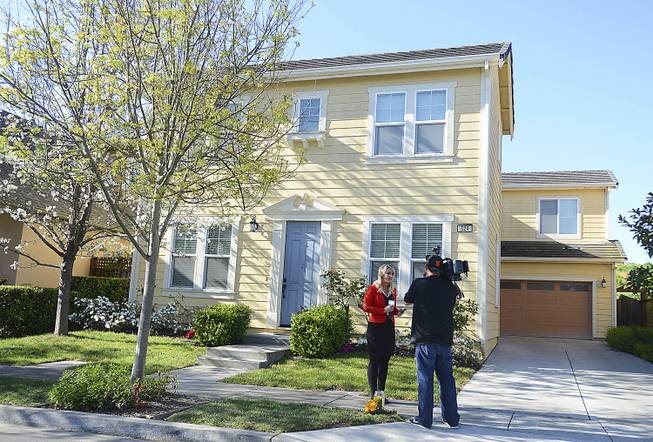
AP Photo/Vallejo Times-Herald, Chris Riley
A news crew reports on the abduction of Denise Huskins in front of the home she was taken from in Vallejo, Calif., Wednesday, March 25, 2015. Police in the San Francisco Bay Area say they’re treating the case of a missing woman who reappeared in Southern California as a kidnapping-for-ransom until evidence points them in another direction.
Tuesday, March 31, 2015 | 6:57 p.m.
SAN FRANCISCO — Two major California newspapers say they've received emails from a person claiming responsibility for a woman's abduction, including one demanding that police apologize to the woman for calling it a hoax.
The San Francisco Chronicle reported Tuesday the anonymous person wrote that Denise Huskins' ordeal last week was real, and her name should be cleared.
One lengthy email said the kidnappers used plastic squirt guns with strobe flashlights and laser pointers duct-taped to them to mimic firearms when they broke into Huskins' Vallejo home in the early hours of March 23.
Huskins' live-in boyfriend, Aaron Quinn, reported the abduction that afternoon, telling police the kidnappers demanded an $8,500 ransom.
Quinn's lawyers have said he awoke to a bright light in his face, and two kidnappers bound and drugged him.
The email alleges the kidnappers put Huskins, 29, in the trunk of Quinn's car and drove off. The car was later found abandoned.
Huskins turned up safe two days later in her hometown of Huntington Beach, where she says she was dropped off. She showed up just hours before the alleged ransom was due.
Later that day, Vallejo police said at a news conference that the alleged kidnapping was a hoax. Police have since declined to comment other than to say they continue to investigate.
Attorneys for Quinn and Huskins maintain the kidnapping was real.
The emails say the crew chose $8,500 for the ransom because it's less than $10,000, the amount at which cash withdrawals must be reported to the federal government.
The Los Angeles Times also reported it received an anonymous email about the case. The sender wrote: "The Mare Island kidnapping was a training mission to test means and methods that would be used on higher net worth targets."
The FBI has declined to comment on the emails, but a spokeswoman said the agency is aware of them.
None of the letters are signed, and they appear to come from dummy accounts, with names such as [email protected]. An email sent to that address by The Associated Press was not returned.
The emails to the Chronicle refer to car thefts and home burglaries that the sender says his group committed. In one, the writer says the group turned to kidnapping-for-ransom because they "did not want to stay thieves or criminals forever."
"What we really wanted was to complete one or two big jobs and then to do whatever we felt like for the rest of our lives," the sender wrote.
Chronicle Editor Audrey Cooper said, "They say it was a legitimate kidnapping and that they feel bad for it. Whether or not these are authentic we've been absolutely unable to prove. That's really up to the FBI at this point."
Huskins' attorney, Douglas Rappaport, said the emails contain details "that only Denise, Aaron and kidnappers would know."

Join the Discussion:
Check this out for a full explanation of our conversion to the LiveFyre commenting system and instructions on how to sign up for an account.
Full comments policy